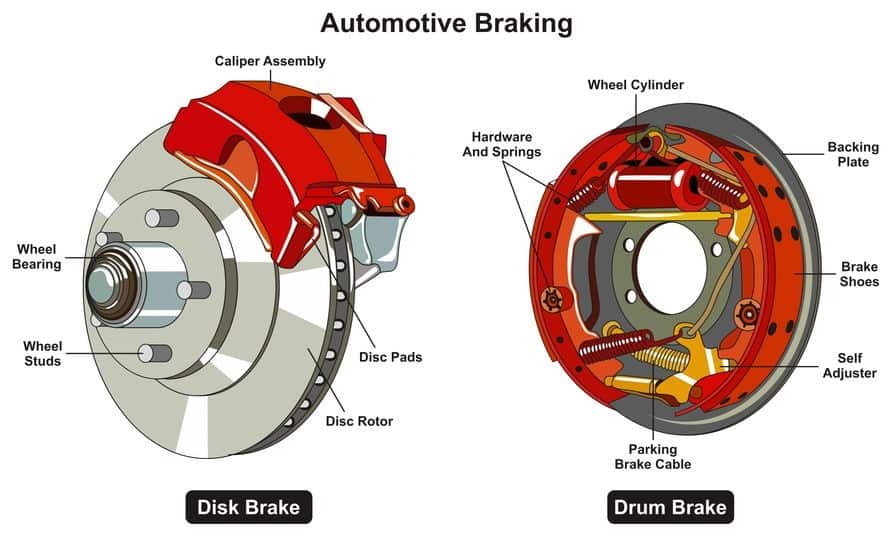Having brakes that function properly means your vehicle will be able to stop safely and confidently. However, nobody wants to hear the annoying squeaking noise announcing each time you’ve come to a stop. Brake squeal is a common problem often caused by worn brake hardware, pads, or rotor finish. But are squeaky brakes dangerous or just annoying?
Brakes squeak, squeal or screech when vibrating brake pads produce a sound in a specific frequency. That sound, however, doesn’t mean your brakes are failing. If your brakes grind or grab, or your car pulls to one side when braking, that’s a different story. In those cases ask a mechanic to check your brakes immediately.
Difference between Drum vs Disc

There are two basic types of braking systems: disc and drum. Most vehicles have disc brakes on at least the front axle, and many have discs all the way around.
Disc brake system components:
- Pads
- Rotors
- Calipers
Drum brake system components:
- Shoes
- Drums
- Wheel cylinders
Common brake Problems
- Your brakes are making noises, including grinding, squealing, or metal on metal noises.

- The pedal feels spongy when the brakes are applied.
- Your vehicle wobbles or pulsates when you brake at any speed.

- Your steering wheel shakes while braking.
- Your car seems to pull to one side when you brake.

- The brake light or ABS light on your dashboard is illuminated.

As soon as you notice any of the following signs, it’s a good idea to bring your vehicle to an Auto Repair near you. These symptoms could indicate brake problems such as bad brake pads, brake fluid leaks, a faulty ABS, and more.
How Long do Brake pads last?
Brake pads contain sacrificial friction materials that wear away with use. How long your brake pads last depends on several factors. For instance, if you tend to drive aggressively, your brake pads will tend to wear faster. Same goes for hard stops and “riding the brakes”. Driving in urban stop-and-go traffic will also result in faster wear, as will driving through hill country with steep elevation changes, or on gravel roads. Hauling heavy loads and pulling trailers will also affect the lifespan of your brake pads.
The composition of the friction material on your brake pads is also a factor in pad life. Semi-metallic brake pads intended for heavy-duty and performance use, for instance, tend to last longer than organic pads, though not as long as ceramics. The type of brake pad you choose will impact the performance of your brake system and the life of your brake pads. Typically, a set of brake pads can last anywhere from 30K to 60K miles.

How often should I change my brake pads?
The life expectancy of brakes depends on varying factors. Poor driving habits such as braking excessively, frequent hard stops, driving uphill and downhill or steep grades, weight of the vehicle including cargo and passengers, the type of brake pads the vehicle is equipped with, brake fluid condition, and a worn out suspension system can reduce the lifespan of brakes. Because of all the different contributing factors, it is recommended to have your brakes inspected often.
Get your brakes checked
Even if you don’t hear a problem, your brakes should be inspected at least once a year. How often you need to get them replaced will vary depending on your car and your brake usage.
Remember, brakes are the most important safety feature on your car, and if something seems wrong with them, get your car inspected by by calling Modern Day Muffler today!

